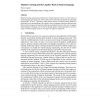Free Online Productivity Tools
i2Speak
i2Symbol
i2OCR
iTex2Img
iWeb2Print
iWeb2Shot
i2Type
iPdf2Split
iPdf2Merge
i2Bopomofo
i2Arabic
i2Style
i2Image
i2PDF
iLatex2Rtf
Sci2ools
123
click to vote
CLIN
2004
2004
Machine Learning and the Cognitive Basis of Natural Language
Machine learning and statistical methods have yielded impressive results in a wide variety of natural language processing tasks. These advances have generally been regarded as engineering achievements. In fact it is possible to argue that the success of machine learning methods is significant for our understanding of the cognitive basis of language acquisition and processing. Recent work in unsupervised grammar induction is particularly relevant to this issue. It suggests that knowledge of language can be achieved through general learning procedures, and that a richly articulated language faculty is not required to explain its acquisition.
CLIN 2004 | Computational Linguistics | Language Processing Tasks | Machine Learning | Machine Learning Methods |
Related Content
| Added | 30 Oct 2010 |
| Updated | 30 Oct 2010 |
| Type | Conference |
| Year | 2004 |
| Where | CLIN |
| Authors | Shalom Lappin |
Comments (0)

